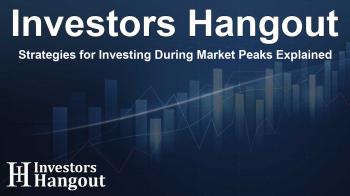Strategies for Investing During Market Peaks Explained

Understanding Market Behaviors: Peaks and Investment Strategies
The stock market has a tendency to rise over time. Historically, whether viewed through six-month, one-year, or even five-year lenses, the S&P 500 has consistently produced positive returns. This pattern holds true even as the market reaches record highs, a phenomenon that has drawn attention from analysts.
How Record Highs Can Favor Investors
Research indicates that investing during moments when the stock market hits all-time highs may actually lead to enhanced average returns over various timeframes. This insight challenges the common investor strategy of holding off on purchasing stocks during such peaks, often out of fear of impending declines.
Breaking Down Common Misconceptions
Many investors hesitate during record highs, opting instead to keep their cash reserves at the ready. However, data suggests that sticking to cash can lead to missed opportunities. JP Morgan analysts emphasize the importance of understanding that markets typically move in cycles of strength, meaning that one high often leads to another.
Market Conditions: Key Considerations
When contemplating investing, one should first evaluate the overall market conditions to determine if they are advantageous. Still, the reality is that predicting whether market prices will dip before climbing again is nearly impossible.
The Risks of Waiting
Delaying investment in hopes of cheaper prices may result in missing significant gains. The essence of effective investing lies in timing; the longer one keeps money on the sidelines, the greater the risk of losing potential returns. Thus, the focus should strip away the pressure of perfect timing.
The Importance of Long-Term Perspectives
Having a long-term horizon can effectively mitigate the stress associated with momentary market fluctuations. Investors should remember that short-term market movements, while they may seem impactful, are not always indicative of the long-term growth potential of an investment.
Emotional Responses and Market Conditions
Psychological factors can strongly influence investor decisions. Often, the fear of loss or emotional responses to trends can drive poor decisions. That’s why maintaining a level-headed approach is crucial. Being emotionally detached helps in making rational and strategic choices rather than impulsive ones.
Strategies for Investment During Market Highs
Utilizing a systematic investment approach can be beneficial. This strategy might involve dollar-cost averaging, allowing investors to purchase shares regularly regardless of the price. This method effectively lessens risks associated with timing the market.
The Journey of the Unlucky Market Timer
Reflecting on personal experiences, there are instances where making sizeable lump-sum purchases at market peaks can feel regrettable. For example, one might invest in an index fund only to see it decline shortly afterward. These experiences can be disheartening, but they also emphasize the importance of patience and strategic planning.
Adapting to Market Fluctuations
Emerging from market downturns often leads to new highs sooner than expected. Market recovery can be rapid, surprising many who do not keep an eye on long-term trends. Historical data supports the notion that after incidents of decline, markets tend to rebound.
Long-Term Outlook: The Best Friend of a Timid Investor
Time serves as an ally for every investor, especially those who may feel unlucky in their market timing. The key takeaway is that time frames play a pivotal role in investment success, underscoring the importance of setting long-term goals and adhering to them.
Frequently Asked Questions
What are the advantages of investing at market highs?
Investing at market highs can lead to potential growth, as new highs often follow previous highs.
Should I wait for prices to drop before investing?
Waiting for lower prices can result in missed opportunities for gains. It's typically beneficial to stay invested.
How can I mitigate risks while investing?
Diversifying your investments and using dollar-cost averaging can help mitigate risks associated with market volatility.
What role does emotional control play in investing?
Maintaining emotional control helps prevent impulsive decisions based on fear or market trends, leading to better investment strategies.
Why is having a long-term perspective important?
A long-term perspective can reduce anxiety and allow investors to ride out market fluctuations effectively, maximizing growth potential.
About The Author
Contact Dominic Sanders privately here. Or send an email with ATTN: Dominic Sanders as the subject to contact@investorshangout.com.
About Investors Hangout
Investors Hangout is a leading online stock forum for financial discussion and learning, offering a wide range of free tools and resources. It draws in traders of all levels, who exchange market knowledge, investigate trading tactics, and keep an eye on industry developments in real time. Featuring financial articles, stock message boards, quotes, charts, company profiles, and live news updates. Through cooperative learning and a wealth of informational resources, it helps users from novices creating their first portfolios to experts honing their techniques. Join Investors Hangout today: https://investorshangout.com/
The content of this article is based on factual, publicly available information and does not represent legal, financial, or investment advice. Investors Hangout does not offer financial advice, and the author is not a licensed financial advisor. Consult a qualified advisor before making any financial or investment decisions based on this article. This article should not be considered advice to purchase, sell, or hold any securities or other investments. If any of the material provided here is inaccurate, please contact us for corrections.

